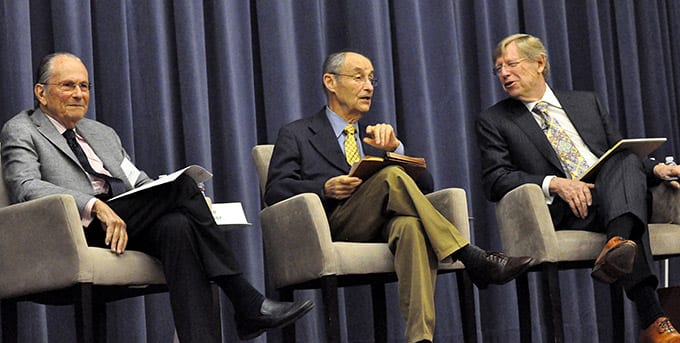
By Andrew Cohen
Weighing in on key rulings from the U.S. Supreme Court’s last term, three heavy hitters provided some light moments—along with expert analysis—during the launch event of Berkeley Law’s Alumni Weekend on September 19.
Star litigator Ted Olson ’65, who has argued more than 60 cases before the Supreme Court, teamed with constitutional law experts and Professors Emeritus Robert Cole and Jesse Choper to assess three major decisions. Cole led the discussion on campaign finance (Williams-Yulee v. The Florida Bar), Choper on the Affordable Care Act (King v. Burwell), and Olson on same-sex marriage (Obergefell v. Hodges).
Campaign concerns
In Williams-Yulee, a candidate running for county judge in Florida had signed a letter seeking campaign contributions. Weighing the First Amendment right to free speech and the state’s interest in preserving public confidence in the courts, the court held that the letter violated Florida’s judicial conduct code—which says candidates “shall not personally solicit campaign funds.”
Cole described the ruling as an exception to the general “theory of the First Amendment that more speech is better.” None of the panelists viewed the decision as a threat to Citizens United v. Federal Election Commission from 2010. In that case, the court ruled that political spending is protected speech under the First Amendment—and that while corporations may not contribute directly to campaigns, they use other means to persuade voters.
“I think as a matter of policy that money in our electoral process poses the greatest threat to our democratic system,” Choper said to booming applause. “But that’s as a matter of policy, and there’s a difference between policy and what the Constitution requires. There are many advantages in the political process besides money. You can be beautiful, handsome—even a Berkeley Law graduate.”
Language leap
In King, the Supreme Court ruled that Affordable Care Act tax credits are available to people who buy health insurance through federal government exchanges. The petitioners argued that the statute’s language offers credits only to those in states with state-operated exchanges.
“The notion was that once Obamacare passed, everyone would want in,” Choper explained. “Surprise: many states said no, we won’t take your money and we won’t set up exchanges.” Explaining how the court “got past the statutory language,” Choper said it stressed that the statute would be “totally undermined and a calamitous result would ensue if citizens in those states were denied coverage.”
An iconic conservative who was U.S. Solicitor General under President George W. Bush and his lead counsel in Bush v. Gore, Olson asked, “Since when did words have to be read out of a statute to get its purpose? It’s not the Supreme Court’s role to decide how to avoid disaster on statutes that Congress can go back and fix.”
With a wry smile, Olson said, “If that had been my case, I like to think it would have come out differently.” Cole quipped, “Yes, the vote would have been 7-2 instead of 6-3.”
Unexpected advocate
Olson stunned many fellow conservatives by serving as lead counsel in the case to overturn California’s Proposition 8—which banned same-sex marriage in 2008—as unconstitutional. After prevailing in federal district court and again on appeal, Olson saw same-sex marriage validated nationwide this year in Obergefell.
He explained how the Supreme Court in other cases have routinely described the right to marry as fundamental under the Constitution, and that more than 1,400 statutes grant rights to married people. “When you deprive certain people of that right,” Olson said, “that’s saying, ‘You’re second class.’”
Olson noted the dramatic shift in public opinion since he filed the Prop 8 case in 2009. Then, Americans opposed same-sex marriage 57 percent to 43 and only three states allowed it. Just four years later, those figures had flipped and more than 25 states allowed it.
During Olson’s district court trial, the judge kept asking his opposing counsel what harm would be done to traditional marriage by legalizing same-sex marriage. “The lawyer finally said, ‘I don’t know,’” Olson recalled. “It was one of those moments where you put your pencil down and say, ‘It’s over.’”
Closing statements
Olson capped the event by sharing various facts about the court, including that being a justice “is good for longevity.” The court chooses roughly 75 cases each term—from more than 9,000 filed. “That breaks down to about eight opinions per justice per year, and they each have four clerks. I can see why they live so long,” Olson said with a laugh.
All three speakers agreed on the vital role of Justice Anthony Kennedy, the frequent swing vote on seminal decisions. Choper called him “the single most powerful official in the United States.”
Describing the Court’s role as “paramount” in our society, Cole noted that “judges may have limited tools for deciding things, but their decisions affect millions.”
Alumni weekend highlights
Other Alumni Weekend highlights included Dean Sujit Choudhry’s state of the school address, which included a video about student life, and Jules Bonjour ’66 receiving the Judge D. Lowell and Barbara Jensen Public Service Award. An afternoon panel, with alumni who were involved in or impacted by the 1968 murder trial of Black Panther Party co-founder Huey Newton for the death of a police officer, examined the trial and the current racial tension between police and black communities.
The weekend events also included a panel of alumni judges discussing bias in the courtroom; and a presentation by the executive directors of the school’s Berkeley Center for Law and Business and the Berkeley Center for Law & Technology on future programming. The East Bay Community Law Center shared the latest news about its Clean Slate Clinic and its work to reduce barriers to employment, housing, and education for Californians with criminal records.